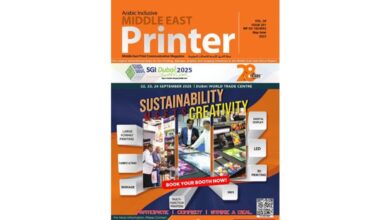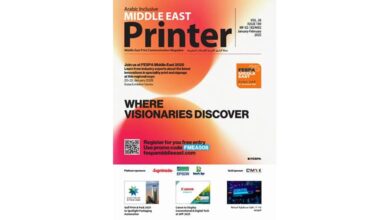A Lot Has Changed the Way People Print
ME Printer speaks to Anand V. Joseph, the Vice President for Sales and Product Management at Blue Rhine, about the company’s plans for 2018 and the challenges the market is currently facing

How was 2017 for Blue Rhine?
In terms of printing trends, one of the biggest difference we have seen is that printers are changing to permanent prints, rather than more temporary or promotional prints. This is especially true, due to the widespread adoption of digital signage. So, fortunately, we were also able to work in the digital signage arena, by partnering with Philips to distribute their range of screens to digital signage integrators.
Hence, this has changed the way people print, because now print is required for storage. It is now more about permanent prints which will not get changed on a promotional or monthly basis. For that we already have digital signage solutions, that can change the content on demand.
This has helped the print industry to move from cheap and economical products to more premium and durable solutions such as high-end floor graphics, high-end textiles, and high-end banners that can be used in retail stores, for instance. We see companies moving towards high-end rigid substrates that can be used in print, especially on the retail side of things.
What trends do you see in the digital solutions arena?
Many of the offset printers who have not entered into the digital arena are struggling. The need and the buyers for offset have decreased a lot in recent years. So, demand for long runs has come down drastically. But offset companies that have started to make a push into digital have the flexibility of providing customers with short-run jobs who need just a few printouts and so on. There has been a sort of resistance from traditional offset printers because the cost per square meter is expensive than digital. However, digital makes sense for customers looking for short runs and it will eventually benefit the entire industry.
Have you planned for any roadshows in the region?
We are now established in five countries of the six in the GCC, such as Saudi Arabia, Qatar, Oman, Kuwait, and UAE. This year, we want to bring our products closer to our customers in those other GCC countries where they don’t have a dedicated signage shop.
Last year, we had huge success in Oman, where we set up small booths in rented areas for each of our key products such as Aslan premium print products. We also set up some of our machines for demo purposes, some of our rigid substrates were also on display, and so on. Suppliers also participated in these events supporting us in every way possible. These events went on for a couple of days, depending on the market size. We plan to run similar roadshows in other markets throughout the year.
What sort of pain points do printers face today?
Competition is the biggest pain point for printers. The amount of print buying has drastically reduced probably due to less footfall in stores. Economic sentiment has also not been great. For instance, if in the earlier years, there were 100 print jobs on the market and only 90 printers, everybody had the opportunity to ask the pricing they wanted and there was enough job to sustain the market.
Today, there are 50 print jobs on the market and 90 printers. Thus, everybody is struggling to maintain their margins and that is a big pain point. There are ways to overcome this challenge through the use of new technologies for sure.





